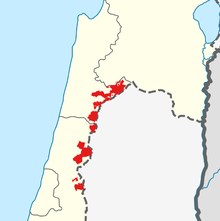Meshoulash
The Meshullash ( Hebrew הַמְּשֻׁלָּשׁ ha-Məschullasch , Plene also:המשולש) or Muthallath ( Arabic المثلث, DMG al-muṯallaṯ ; both means 'the triangle') originally referred to a settlement area formed by the city triangle of Tira , Tayyibe and Qalansuwa in the central district of Israel , now the entire densely populated area of Umm al-Fahm (this in the Haifa district ). Meshullash is also the name of an important business district in Jerusalem.
history
Although the Meshullash area was captured by Iraqi units in the war for Israel's independence and successfully held until the end of the war , the Kingdom of Iraq withdrew its troops in March 1949 without agreeing on terms of the ceasefire with Israel. In the armistice agreement of 1949 in Rhodes, Israel and Jordan then agreed to divide the area cleared by Iraqi troops by mutual agreement and fixed the course of the Green Line . Israel and Jordan also agreed that Israel would offset these territorial gains elsewhere through territorial cessions. Meshullash came to Israel with effect from May 20, 1949, while areas southwest of Hebron and southeast of Beit She'an came to Jordan.
In addition to Galilee and the Negev , the Meshullash is one of the areas with a high Arab population in Israel. One of the proposals of the so-called Lieberman Plan launched by Avigdor Lieberman in 2004 was the inclusion of Meshullash in a future Palestinian state in exchange for Israeli settlement areas in the West Bank . This plan is overwhelmingly rejected by the Israeli Arabs.
Individual evidence
- ↑ David Kroyanker (דָּוִד קְרוֹיָאנְקֶר): The architecture of Jerusalem: 3,000 years of the Holy City. Hubertus von Gemmingen (translator). Kohlhammer, Stuttgart / Berlin et al. 1994, ISBN 3-17-013165-6 , p. 145.
- ↑ Ilan Pappe : "The Failure of Politics: A Historical Approach to the War of 1948." In: Babylon: Contributions to the Jewish Present . Vol. 3, No. 4, September 1988, pp. 24-39, here p. 31.
- ↑ Angelika Timm : Tolerance in political culture [...] - The example of Israel. Leibniz Online 1, No. 1, 2005, p. 6.
- ↑ Fadi Eyadat: New Poll Shows 68.4% of Israeli Jews Fear Israeli Arab Uprising. In: Haaretz . March 12, 2007. (haaretz.com)
